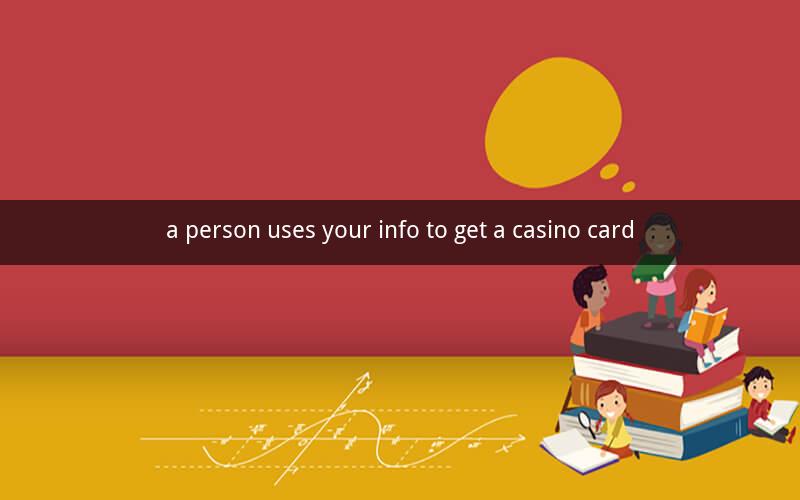
Table of Contents
1. Understanding the Situation
2. Identifying the Culprit
3. The Casino Card Scam
4. Protecting Your Identity
5. Reporting the Incident
6. Legal Actions
7. Preventing Future Incidents
8. The Emotional Impact
9. Financial Repercussions
10. Seeking Support
1. Understanding the Situation
When you realize that someone has used your personal information to obtain a casino card, it can be a shock. The casino card, often used for loyalty programs and rewards, is now a tool in the hands of an individual who has no right to it. This situation raises several questions, including how it happened, what the consequences are, and what you can do to mitigate the damage.
2. Identifying the Culprit
Determining who has used your information is crucial. It could be a friend, a family member, or even a stranger who has obtained your personal details through various means, such as phishing, hacking, or simply by accessing your information. Understanding how your information was obtained can help you take appropriate action.
3. The Casino Card Scam
The casino card scam involves using someone else's personal information to open a fraudulent account. The scammer may use the card to make purchases, collect rewards, or even sell the card to others. It is important to understand that the casino may not be aware of the scam until it is reported.
4. Protecting Your Identity
To protect your identity, you should take immediate action. Change your passwords, monitor your financial accounts, and notify your bank and credit card companies. Consider placing a fraud alert on your credit reports to prevent any further unauthorized activity.
5. Reporting the Incident
Report the incident to the casino where the card was obtained. Provide them with all the necessary information, including the date the card was issued and any other relevant details. You should also report the incident to the authorities, such as the police or the Federal Trade Commission (FTC).
6. Legal Actions
If you believe that your information was obtained through illegal means, you may want to seek legal advice. A lawyer can help you understand your rights and guide you through the legal process. Depending on the circumstances, you may be able to file a lawsuit against the individual or entity responsible for the fraud.
7. Preventing Future Incidents
To prevent future incidents, you should take steps to secure your personal information. Use strong, unique passwords for all your accounts, be cautious of phishing scams, and keep your personal information confidential. Regularly monitor your financial accounts and credit reports for any suspicious activity.
8. The Emotional Impact
Dealing with identity theft can be emotionally challenging. It is important to seek support from friends, family, or professionals if you feel overwhelmed. Remember that you are not alone, and there are resources available to help you through this difficult time.
9. Financial Repercussions
The financial repercussions of identity theft can be significant. You may be responsible for paying back any fraudulent charges made on your accounts. It is important to keep detailed records of all communications and expenses related to the incident.
10. Seeking Support
If you have been affected by identity theft, you may want to seek support from organizations that specialize in helping victims of identity theft. These organizations can provide guidance, resources, and emotional support.
Frequently Asked Questions
1. What should I do if I suspect someone has used my information to obtain a casino card?
- Change your passwords, monitor your financial accounts, and report the incident to the casino and authorities.
2. How can I protect my identity from being stolen?
- Use strong, unique passwords, be cautious of phishing scams, and keep your personal information confidential.
3. What are the legal consequences of using someone else's personal information to obtain a casino card?
- It is considered identity theft and can result in legal action, including fines and imprisonment.
4. How can I recover from identity theft?
- Report the incident, seek legal advice if necessary, and take steps to protect your identity in the future.
5. What should I do if I am unable to pay back fraudulent charges?
- Contact your creditors and explain the situation. They may offer a payment plan or other solutions.
6. How can I prevent future incidents of identity theft?
- Regularly monitor your financial accounts, use strong passwords, and be cautious of sharing your personal information.
7. What is the role of the Federal Trade Commission (FTC) in identity theft?
- The FTC provides resources and guidance to help victims of identity theft and investigates fraudulent activities.
8. How can I seek emotional support after experiencing identity theft?
- Talk to friends, family, or professionals who can provide guidance and support during this difficult time.
9. What are some signs that my identity has been stolen?
- Unexpected credit card charges, missing mail, and unexpected calls from debt collectors are some common signs.
10. How long does it take to recover from identity theft?
- The recovery process can vary, but it typically takes several months to a year to resolve the issues related to identity theft.